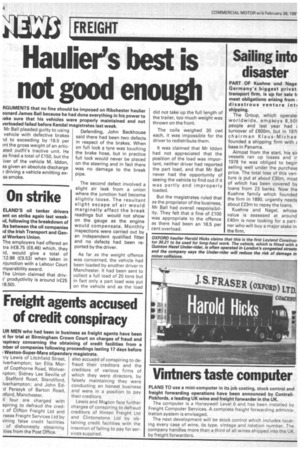Haulier's best is not good enou
Page 16

If you've noticed an error in this article please click here to report it so we can fix it.
RGUMENTS that no fine should be imposed on Ribchester haulier aonard James Ball because he had done everything in his power to lake sure that his vehicles were properly maintained and not verloaded failed before Kendal magistrates last week.
Mr Ball pleaded guilty to using vehicle with defective brakes id to exceeding by 18.5 per nit the gross weight of an articated outfit's tractive unit. He as fined a total of £150, but the iver of the vehicle M. Iddon, as given an absolute discharge r driving a vehicle emitting exss smoke.
Defending, John Backhouse said there had been two defects in respect of the brakes. When on full lock a tyre was touching the brake hose, but in practice full lock would never be placed on the steering and in fact there was no damage to the break pipe.
The second defect involved a slight air leak from a union where the junction had become slightly loose. The resultant slight escape of air would. marginally affect the break readings but would not show on the gauge as the engine would compensate. Monthly inspections were carried out by an independent qualified fitter and no defects had been reported by the driver.
As far as the weight offence was concerned, the vehicle had been loaded by another driver in Manchester. It had been sent to collect a full load of 20 tons but in fact only a part load was put on the vehicle and as the load did not take up the full length of the trailer, too much weight was thrown on the front.
The coils weighed 30 cwt each, it was impossible for the driver to redistribute them.
It was claimed that Mr Idcion had not appreciated that the position of the load was important, neither driver had reported the part load, and that Mr Ball never had the opportunity of seeing the vehicle to find out if it was partly and improperly loaded.
But the magistrates ruled that as the proprietor of the business, Mr Ball had overall responsibility. They felt that a fine of £100 was appropriate to the offence as there had been an 18.5 per cent overload.




























































































